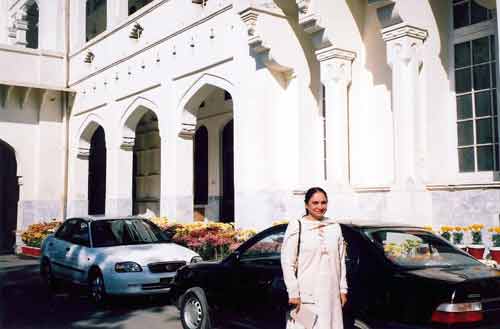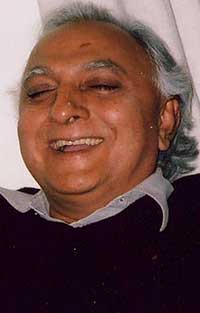SWEDISH SOUTH ASIAN STUDIES NETWORK
Staffan’s meetings in Lahore Sunday 6 December 2003:
Staffan arrived late Friday 5 December by flight from Islamabad, and stayed over night at Best Western Hotel in the Liberty (Market) area.
Meeting with scholars from King Edward Medical College (KEM)
 Prof.
Rifat Nisar Ashraf, head of the Department
of Social and Preventive Paediatrics (photo to the right, in
front of KEM), and Prof. Emeritus Lars Åke
Hanson, Dept. of Clinical Immunology at
Sahlgrenska Academy, Göteborg University (at the time visiting
Pakistan) came around 9 AM and brought Staffan to the department at King
Edward Medical College (KEM). Web site: www.kemc.edu.
Prof.
Rifat Nisar Ashraf, head of the Department
of Social and Preventive Paediatrics (photo to the right, in
front of KEM), and Prof. Emeritus Lars Åke
Hanson, Dept. of Clinical Immunology at
Sahlgrenska Academy, Göteborg University (at the time visiting
Pakistan) came around 9 AM and brought Staffan to the department at King
Edward Medical College (KEM). Web site: www.kemc.edu.
Lars Åke Hanson is pursuing panel studies, initiated
by Prof. Fehmida Jalil already in 1964. They
have also collected data from the year 1984, which they now want follow
up.
The 64 generation consists of a large sample of about 2 400 individuals
taken from one village, one peri-urban and one central slum in Lahore,
and one upper middle class area. The 84 generations is smaller (less than
2 000). In both cases, a number of characteristics like birth weight,
etc. have been recorded. The original measurements have been followed
up by subsequent health status investigations. Most individuals have stayed
in their area in the village and the central slum, while there has been
considerable out migration from the peri-urban slum and the middle class
area.
Lars Åke now wants to include more social variables in the follow
up study. They have already established that low birth weight is connected
with higher incidence of ill health and disease later on life. What about
occupational career, family, and children. It is a very interesting study,
and since Staffan is attempting to do a panel study in Tamil Nadu, a decsio
was made that he would be included in the reference group for the Lahore
study.
Rifat Ashraf informed about her department. They are engaged
in practical medical work both in urban and rural clinics – in cooperation
with NGOs. They have a strong community orientation in their work, and
they have also managed to make the community orientation a leading theme
in the overall curriculum of the courses at KEM.
We went to see the Principal, Prof. Mumtaz Hasan,
who brought us to a seminar hall in the main building of the university.
Altogether nine professors had gathered there to listen about SASNET:
• Prof. Mumtaz Hassan,
• Prof. Rifat Nisar Ashraf
• Prof. Kamran Aziz, Biochemistry
• Prof. Ahmed Wasim Yusuf, Obstetrics
and Gynaecology
• Prof. Sabrina Suhail Pal, Dermatology
• Prof. Samina Jahangir, Ophthalmology
• Prof. M. Zafor Ullab Khan, Medicine
• Prof. Ghazanfar Ali Sheikh, Paediatrics
• Dr. J.A. Naveei, Pathology
After Staffan’s presentation of SASNET, there were
quite a few opinions about SASNET, and about sending students for higher
studies in Sweden. Almost all claimed that the students at KME were very
proficient in English and would have no difficulties in following the
courses there.
The Principal, Prof. Mumtaz Hasan, gave an overview of the activities
at King Edward Medical College. Started in 1860 it is one of the oldest
academic institutions in Pakistan. Currently it has about 4 000 students
and a staff of totally about 800, out of whom 42 are full professors.
Three hospitals are integrated, the general hospital attached to the campus,
and two hospitals for women. Total annual budget is around 60 Crore rupees
(about 100 million Swedish crowns). There is need for donations, since
some of the equipment and buildings are old and need to be renewed. The
government funding is $ 2 per patient only.
After the meeting, Rifat showed the campus. Many of the original buildings
were nicely maintained, and new ones had been constructed in the same
architectural style. There are nice green spots with trees and flowerbeds
all around the campus, as well as a sports ground.
Lahore School of Economics (LASE)
Web site: http://www.lse.edu.pk/
 After
lunch, Prof. Sajjad Naseer brought Staffan
to this school, in which he has a part time assignment as professor. We
met Prof. Shahid Amjad Chaudhry, who is the
Rector of the school (photo to the right), after serving for
a long career as a civil servant in the government administration, World
Bank, and lately as highly placed manager in the Public Sector. He was
responsible for the Pakistani Afghanistan policy under the first years
of President Musharraf’s rule. Originally he hails from a farmer
household, and he still has 125 acres of land near Lahore, in which he
is running farm operations.
After
lunch, Prof. Sajjad Naseer brought Staffan
to this school, in which he has a part time assignment as professor. We
met Prof. Shahid Amjad Chaudhry, who is the
Rector of the school (photo to the right), after serving for
a long career as a civil servant in the government administration, World
Bank, and lately as highly placed manager in the Public Sector. He was
responsible for the Pakistani Afghanistan policy under the first years
of President Musharraf’s rule. Originally he hails from a farmer
household, and he still has 125 acres of land near Lahore, in which he
is running farm operations.
LASE started in the 1990s and is a private university run
by a trust. The staff consists of 50 faculty and 30 part time teachers.
It has about 800 students, out whom 300 are Masters students, and about
50 M Phil and PhD students. Annual fee is between 2–3 000 $. The
school has a strong financial position, and welcome foreign scholars and
professors. There is a new campus near the airport, with 30 cottages for
visitors who are then taken to the school in shuttle busses. Shahid would
also welcome foreign PhD students, for which they could provide board
and lodge. They would welcome comparative studies in South Asia, say,
for example, of similar phenomena in India and Pakistan. Outsiders’
views would be useful.
The school is oriented to economics, business economics, management, and
IT. But the courses are embedded in a broader context of history and social
studies. One course give is called ‘City of Lahore’.
LASE publishes a journal: The Lahore Journal of
Economics, which is internationally recognised.
Shahid Chaudhry considers the school and himself to be social liberal,
and institutional economics is part of the curriculum. He does not think
industrial development is the only road for Pakistan, especially given
the growing competition from China. Agriculture should be promoted since
Pakistan has one of the richest river deltas in the world. On that basis
a more broad based economy could grow.
SASNET - Swedish South Asian Studies Network/Lund
University
Address: Scheelevägen 15 D, SE-223 70 Lund, Sweden
Phone: +46 46 222 73 40
Webmaster: Lars Eklund
Last updated
2006-01-27
